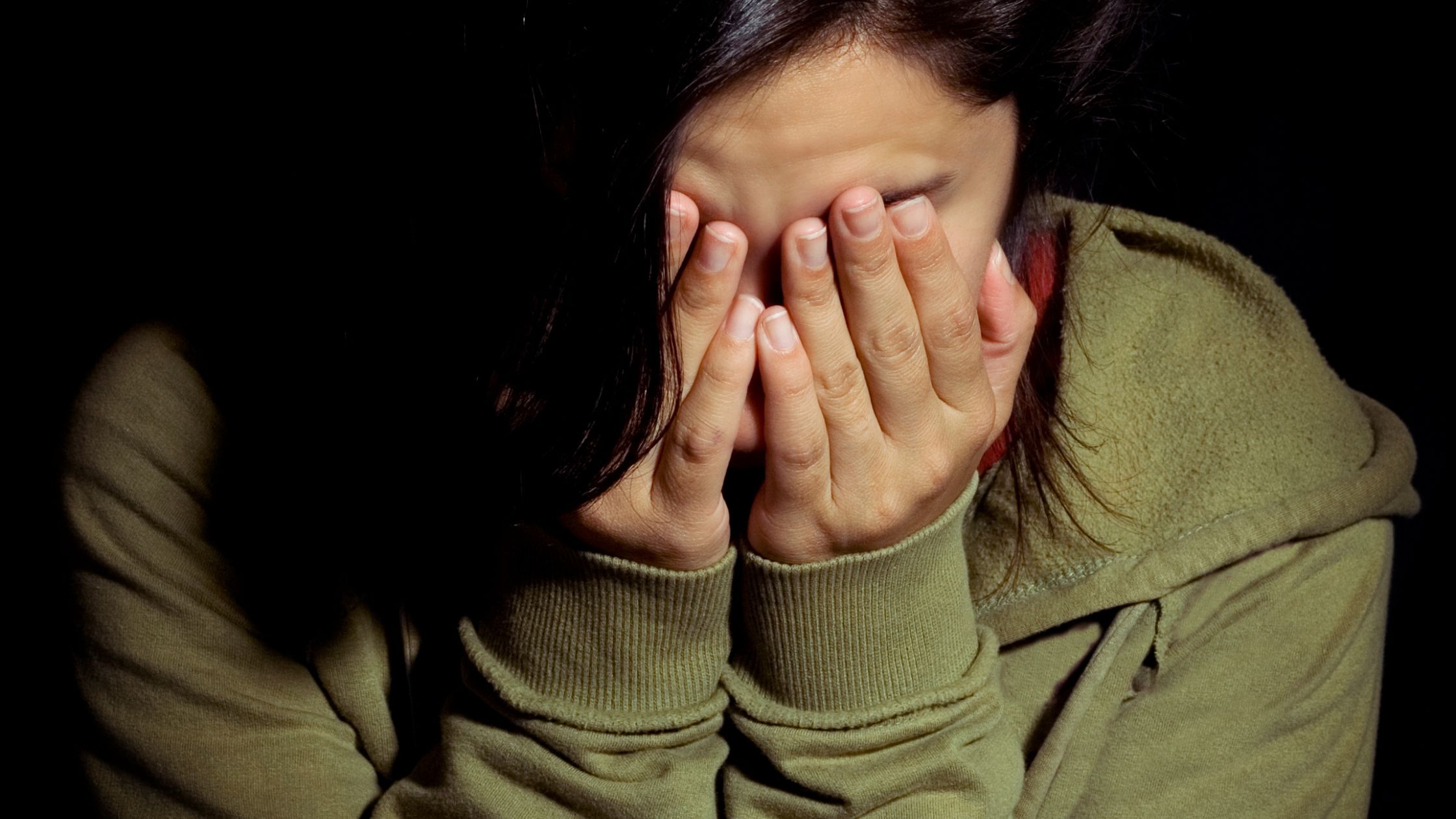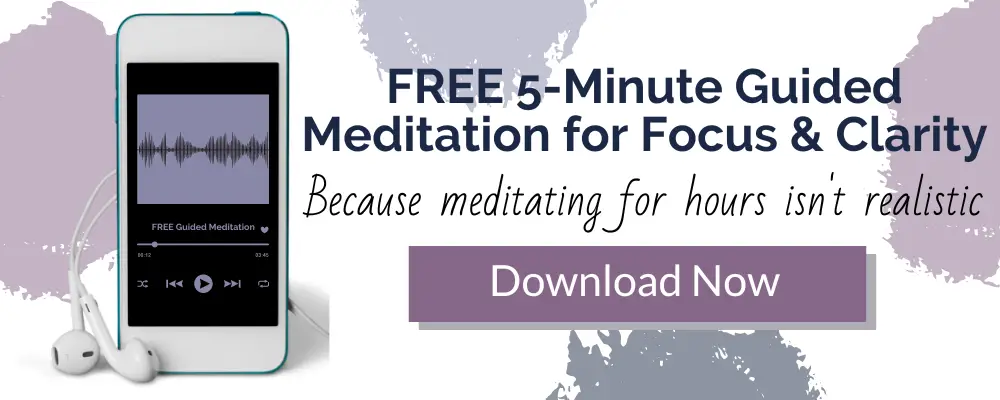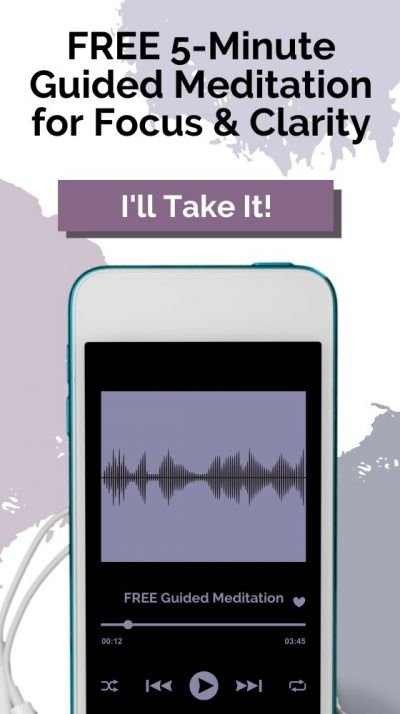Why Do I Cry When I Meditate? What’s Behind the Tears

Meditation is a powerful tool for cultivating inner peace and gaining focus and clarity. But let’s face it, it can also stir up emotions you didn’t even know were there. Many people find themselves crying while meditating, sometimes for what seams like no reason.
If this has happened to you, you may be wondering: why do I cry when I meditate? You cry when you meditate because when you meditate, you’re clearing out all of the clutter in your mind and heart. You’re confronting your fears, your doubts, your regrets, and your pain, and you allow all of those buried thoughts and feelings to surface. Sometimes, that can make you cry.
Before we go any further, let’s get one thing straight: crying during meditation is normal — it’s a good sign. It means you’re releasing negative energy that’s been pent up. It’s like making space in your mental closet for positive vibes to move in. If you find yourself crying during meditation, don’t beat yourself up, its normal to cry. Embrace it! It’s all part of the mindfulness and meditation journey.
I totally get that crying during meditation can be overwhelming, especially if you’re a meditation newbie. But, that’s why I’m here. I’ll dive into the reasons why you might cry during meditation and offer tips to handle these emotional waves. So, grab your favorite comfort blanket and let’s delve in!
Why Do I Cry When I Meditate
Crying during meditation can feel like a mystery, and it’s something I’ve seen a lot as a meditation teacher. But, it’s a completely normal part of the journey. In many ways, it’s like growth spurts of the soul, showing that you’re letting old emotions surface and starting to heal.
It’s like cleaning out your mental wardrobe. When you start sorting through your mental clothes, you might find some things you’ve forgotten or that bring back memories. You may also find stuff you’re ready to get rid of. And that’s exactly how it is with emotions.
There’s a whole laundry list of reasons why meditation might cause you to shed tears. Here are just a few of the top contenders:
Emotional Release
Meditation is like a magnifying glass for our thoughts and feelings. It allows us become more aware of our thoughts and feelings. This heightened awareness allows you to get in touch with your emotions. It can bring up strong emotions that we may be subconsciously suppressing, ignoring or avoiding. Often emotions may be bubbling right under the surface, but need help being released.
Crying can be a natural response to dealing with these emotions. One of the many benefits of meditation is that it allows our body to release these repressed emotions and allows us to let go of what no longer serves us.
Catharsis
Sometimes, crying is a form of catharsis. Catharsis is the practice of letting go of powerful feelings through expressing them or letting them out. It’s like a good cry that leaves you feeling lighter and more peaceful afterward.
Sometimes, we need to let out our emotions to make room for new insights and perspectives. And that’s what might happen when you start crying during meditation. So the next time you’re think you need to stop yourself from crying, don’t. Let it all out.
Inner Conflict
Inner conflict is a common source of tears during meditation. Meditation helps us become more aware of our thoughts and emotions. This heightened awareness can reveal conflicting beliefs or desires.
Maybe you’re torn between going after your dream job or sticking with a stable, but unfulfilling career. Or you could be struggling with a relationship and unsure whether to stay or leave. Whatever the case, these inner conflicts can cause us to cry as we work through them.
It’s like we’re slowly unpacking our mental baggage and trying to make sense of it all. Sometimes, crying can help release the emotions that we’ve been suppressing or ignoring for a long time. It can also help gain clarity and insight into our inner world, so we can make better decisions and live a more authentic life.
Healing Trauma
For those who have experienced trauma, meditation can be a powerful tool for healing. However, it can also bring up uncomfortable emotions and memories that can trigger tears.
This is a sign that your meditation is working to release negative emotions and promote healing. It’s like you’re peeling off the layers of pain and hurt, one by one, until you can finally let go.
But it’s not an easy process. It can be painful, scary, and overwhelming to confront our past traumas. If you’re dealing with trauma it’s important to take care of yourself during this process and seek professional help if needed.
Connecting With Others
Meditation can help us feel more connected to ourselves and those around us. This heightened sense of connection can stir up emotions and result in tears. In this case they can be tears of hippieness, joy or gratitude. It’s like we’re opening our hearts to the world and letting in all the good vibes.
This is a sign of our deepening connection to others and our ability to feel and express empathy. It’s important to embrace these positive emotions and allow them to flow freely and naturally.
If you find yourself crying because of this deep connection with others, embrace it! Allow yourself to feel the joy and gratitude that come with these emotions. Let them fill you up and lift your spirits.
Emotional Empathy
Highly empathic people may find that they cry during meditation as they tune into the emotions of others. This is a sign of your deep compassion and empathy for others.
As empathic individuals, we may feel the pain and suffering of others as if it were our own. Try setting boundaries, such as limiting your exposure to negative news or social media, or practicing grounding techniques to help you stay centered.
Remember, your empathy and compassion are beautiful qualities, but they can also be a double-edged sword. It’s important to acknowledge and honor these emotions, but also to practice self-care and set boundaries to avoid emotional burnout.
Spiritual Awakening
For some people, meditation can be a catalyst for spiritual awakening. This can be a deeply emotional experience that may bring up tears as you connect with your higher self or the divine.
The tears are a sign of the profound shift happening within you and the release of old beliefs and patterns. It’s important to honor this process and seek guidance from spiritual mentors or teachers if needed.
Ways to Cope With Tears During Meditation
If you cry during meditation, don’t worry. It’s a normal to cry during meditation and know that crying is a healthy part of the process. Here are some tips for coping with crying during meditation:
Breathing Techniques
If you feel like you’re losing control during your meditation, take some time and focus on your breath. Breathing exercises can be a great way to calm your mind, help you regain your composure, calm your mind, and help you to stop crying.
Take slow, deep breaths and count to ten on each inhale and exhale. This can help you regulate your breathing and shift your focus away from your emotions.
You can also try focusing on the sensation of your breath as it moves in and out of your body. Pay attention to how it feels in your nostrils, chest, and abdomen. This can help you stay present and grounded in the moment.
If you find that one technique isn’t working for you, try another one. With practice, you’ll find the technique that works best for you
Using Affirmations
Affirmations are positive statements that can help you shift your thoughts and emotions. Repeat a positive affirmation, such as “I am peaceful and calm,” to yourself during your meditation.
These affirmations can help you feel more grounded and centered, and they can also help you cultivate a more positive mindset. Instead of dwelling on negative thoughts and emotions, you can shift your focus to something more uplifting and empowering.
It’s important to choose affirmations that resonate with you and feel authentic. If you don’t believe the affirmation you’re repeating, it won’t be effective. So take some time to choose an affirmation that feels true and meaningful to you.
Visualization Exercises
Visualization exercises can help you connect with your emotions in a positive way. Imagine yourself surrounded by a warm, healing light.
Visualize yourself releasing your emotions into this light and letting them go. Imagine the light absorbing all of the negative energy and leaving you feeling peaceful and centered.
You can also try visualizing a peaceful scene, such as a beach or a forest. Picture yourself walking through this scene and allowing all of your worries and fears to melt away.
Try Journaling
Writing down your thoughts and emotions can be a powerful tool for processing your feelings. Try journaling before or after your meditation session to help you gain clarity and insight into your emotions.
Write down your thoughts and feelings without judgment, and allow yourself to express whatever comes up for you. This can help you release any pent-up emotions and gain a better understanding of what’s causing them.
You can also use your journal to track your progress and reflect on your meditations. Write down any insights or breakthroughs you have during your meditation, and use them to guide your practice going forward.
Take a Break
If you find yourself getting overwhelmed during your meditation, it’s okay to take a break. Remember there’s no right or wrong way to meditate.
Get up from your cushion, stretch, take a walk, or have a glass of water. Sometimes, a short break can help you reset and come back to your meditation with a clearer mind.
Practice Self-Compassion
It’s important to be gentle and kind with yourself as you explore your emotions during meditation. Practice self-compassion by speaking kindly to yourself and acknowledging your feelings without feeling like you need to pass judgment.
Remember that it’s okay to feel and express your emotions, even if they’re uncomfortable or difficult. Don’t beat yourself up for crying or feeling overwhelmed. Instead, offer yourself words of encouragement and support.
Treat yourself as you would treat a good friend who is going through a tough time. Show yourself love and compassion, and remember that you’re doing the best you can.
Listen to Soothing Music
If you find that music helps you relax and unwind, try listening to some soothing music during your meditation. Choose music that’s calming and uplifting, and let it help you release your emotions.
Music can be a powerful way to shift your energy and connect with your emotions. It can also help drown out any distracting thoughts or sounds that might be getting in the way of your meditation practices.
Try experimenting with different types of music to see what resonates with you. Some people prefer soft instrumental music, while others enjoy guided meditations with music in the background.
Talk to a Friend
 If you’re feeling overwhelmed after you meditate, reach out to a friend, loved one, or someone you trust. Share your thoughts and feelings with them, and let them support you.
If you’re feeling overwhelmed after you meditate, reach out to a friend, loved one, or someone you trust. Share your thoughts and feelings with them, and let them support you.
Sometimes, just talking things out with someone can help you gain perspective and feel better. It can also help you release any pent-up emotions and gain a better understanding of what’s causing them.
Choose someone who you feel comfortable talking to and who can offer you a listening ear without judgment. Remember that it’s okay to ask for help and support when you need it.
When to Seek Help
While crying during meditation is a normal and healthy part of the process, there are times when it may be a sign of unresolved issues or difficult emotions. If you find yourself crying during every practice or if your emotions feel overwhelming, it may be time to seek help from a professional therapist or counselor.
Seeking professional help can be a crucial step in your healing journey, and important for your mental health. A therapist or counselor can provide you with the tools and support you need to work through your trauma in a safe and healthy way. They can also help you develop coping strategies for managing your emotions during meditation and in everyday life.
Try if for Yourself
Why do I cry when I meditate? Crying during meditation is a natural and healthy way to release negative emotions and let go of what no longer serves us. It’s a sign that we’re becoming more in touch with our emotions and our mind and body.
If you find yourself crying during meditation, try the coping strategies we’ve outlined here, such as breathing techniques, affirmations, visualization exercises, and journaling. And if your emotions feel overwhelming, don’t hesitate to seek help from a professional.
Remember, crying during meditation is a sign of growth and healing. Let your tears flow and let them go. Whether you’re a seasoned meditator or just starting out, I hope this information will help you on your journey to inner peace and emotional balance.













